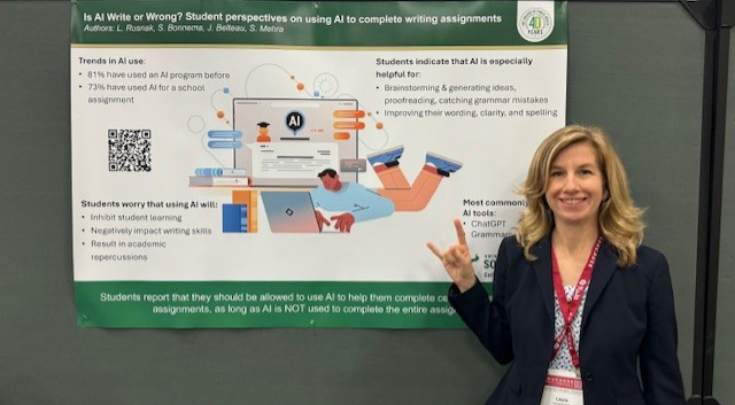Should a student use artificial intelligence (AI) to complete an essay, and if so, how can instructors teach the traditional skills of good writing?
These are questions posed by Laura Rusnak, director of undergraduate programs in USF’s College of Public Health (COPH), who specializes in workforce development and career readiness. Earlier this month, she presented her findings at the EDUCAUSE conference in San Antonio, an annual event focusing on higher education technology.
Her poster presentation, Is AI Write or Wrong: Student perspectives on using AI to complete writing assignments, addressed how the student use of AI programs is forcing higher education professionals to re-evaluate how faculty teach and assess writing skills.
“In order to prepare students for workplaces that will likely require employees to effectively leverage AI for professional writing, institutions must first gain an accurate understanding of AI use within its student population,’’ Rusnak noted.

Laura Rusnak presented her findings at EDUCASE in October 2024. (Photo courtesy of Rusnak)
“We wanted to explore how students are using AI, including the specific programs they prefer,” she said. “We also wanted to explore their perceptions of how using AI within a writing course might impact their learning.’’
Students provided candid feedback about how they used AI, what may have influenced them to avoid using AI, and made recommendations for faculty teaching writing skills to undergraduate students.
Rusnak collected both qualitative and quantitative data to explore students’ experiences with, and preferences for, using AI programs to complete writing assignments. Quantitative findings focus on which programs students prefer to use and their perceptions of the impact that AI has on learning outcomes. Qualitative data highlights how and why students use AI to complete writing assignments, as well as factors that influence students to avoid using it.
The findings were based on survey feedback from 74 students taking a senior level writing course taught within the COPH. Anonymous responses to both closed-and open-ended questions provided insight into how they believe AI should continue to be used in assignments, including limitations faculty should place on student use.

(Photo courtesy of Canva)
Rusnak believes the study is important because a more detailed understanding of student use of, and preferences for, AI allows teachers to leverage this emerging technology to improve writing skills.
The mixed method approach – quantitative and qualitative – created a broad picture of student experiences with, and preferences for using AI in writing. It also focuses on the perspectives of a diverse group of students. For example, the proportion of student respondents within the study who identify as Hispanic (27%), Black (19%), Asian (18%) and American Indian/Alaskan Native (1.3%) is higher than the national college student population (21%, 13%, 8%, and 0.7%, respectively). This diverse sampling can help inform higher education professionals on best practices for leveraging AI to improve writing skills.
Commonly used AI programs include Chat GPT and Grammarly. While Grammarly is a proofreading option offered within the course, other AI tools are neither encouraged nor prohibited for assignment completion. If students chose to use Grammarly for proofreading purposes, they had to compare the quality of the feedback they received from this AI program to proofreading support provided by either the USF Writing Studio or live writing tutors on TutorMe.com.
Students indicated that AI is especially helpful in brainstorming and generating ideas, as well as proofreading their writing to help catch grammar mistakes. However, they also felt it could inhibit learning in college and negatively affect their writing skills, as well as result in academic repercussions.
When asked if allowing students to use AI programs to help them complete writing assignments negatively impacts student learning, 44% of students disagreed. However, 33% remained neutral and 22% indicated that it did have a negative impact on learning.
“This suggests a generally positive view, but also ambivalence toward AI,’’ Rusnak notes. “The results indicate that students are still navigating their own uncertainty regarding the use of AI for writing assignments.’’
Other COPH authors that contributed to the survey development, data analysis and EDUCAUSE conference poster creation included Sarah Bonnema, adjunct faculty; Jennifer Belteau, adjunct faculty; and Dr. Shabnam Mehra, faculty member within the office of undergraduate studies.
